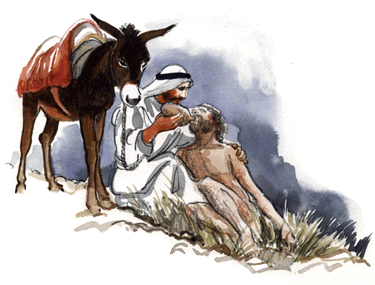The next day he (Samaritan) took out two denarii, gave them to the innkeeper, and said, ‘Take care of him; and when I come back, I will repay you whatever more you spend.’ Luke 10:35 (NRSV)
The Good Samaritan, of all of Jesus’ parables this one is arguably the best known. We hear the term “Good Samaritan” in our day. Many states have been passing Good Samaritan laws. South Dakota is the headquarters of the Good Samaritan Society. There are even churches that have taken the name of Good Samaritan. Our first response after hearing the parable would be to identify with the Good Samaritan. After all, we like to think that we would stop and help someone who is in need. The  response of the lawyer and others that Jesus told the parable to would have been entirely different. The last person they would identify with would be the Samaritan. The term Good Samaritan would have been considered an oxymoron. They were hated, despised, thought of as half-breeds. In the previous chapter in Luke, James & John want to call down fire from heaven to destroy a Samaritan village that has failed to welcome Jesus. So who is the Good Samaritan? I believe Jesus wanted us to think of him as the Good Samaritan who helped all in need no matter what the cost. That is the picture that Luke paints of Jesus. So who in the parable did Jesus want us to identify with? The lawyer who tried to justify himself? If we are honest we would have to say, guilty. What about the priest and Levite who are too busy to help the injured man? If we are honest we would have to say, guilty. What about the robbers? Most would have difficulty identifying with them. But who of us have not caused an injury to another? Guilty! But it is difficult to identify with a character that makes you feel guilty. That leaves two characters in the story. First, is the injured man. Most of us can admit that at some time in our life we have been injured and needed help. Hopefully, we can reflect back and see how Jesus, the Good Samaritan, came to help us through the difficulties. The person I most identify with is the innkeeper. He seems to be the most insignificant of all the characters, yet he plays a valuable role in helping the injured man recover. He becomes Jesus’ helper. To me this is what the ministry is all about; being Jesus’ helper. Helping Jesus bring a message of hope to those facing hopeless situations, comfort to those who need comfort, love to those who need love, healing to those who need healing. That is true for all of us. Jesus does not expect us to take over the role of being a Good Samaritan. If we do we will soon burn ourselves out. Rather Jesus wants us to see our role as assisting him to bring healing to the world. May all of us faithfully respond to the task Jesus gives us.
response of the lawyer and others that Jesus told the parable to would have been entirely different. The last person they would identify with would be the Samaritan. The term Good Samaritan would have been considered an oxymoron. They were hated, despised, thought of as half-breeds. In the previous chapter in Luke, James & John want to call down fire from heaven to destroy a Samaritan village that has failed to welcome Jesus. So who is the Good Samaritan? I believe Jesus wanted us to think of him as the Good Samaritan who helped all in need no matter what the cost. That is the picture that Luke paints of Jesus. So who in the parable did Jesus want us to identify with? The lawyer who tried to justify himself? If we are honest we would have to say, guilty. What about the priest and Levite who are too busy to help the injured man? If we are honest we would have to say, guilty. What about the robbers? Most would have difficulty identifying with them. But who of us have not caused an injury to another? Guilty! But it is difficult to identify with a character that makes you feel guilty. That leaves two characters in the story. First, is the injured man. Most of us can admit that at some time in our life we have been injured and needed help. Hopefully, we can reflect back and see how Jesus, the Good Samaritan, came to help us through the difficulties. The person I most identify with is the innkeeper. He seems to be the most insignificant of all the characters, yet he plays a valuable role in helping the injured man recover. He becomes Jesus’ helper. To me this is what the ministry is all about; being Jesus’ helper. Helping Jesus bring a message of hope to those facing hopeless situations, comfort to those who need comfort, love to those who need love, healing to those who need healing. That is true for all of us. Jesus does not expect us to take over the role of being a Good Samaritan. If we do we will soon burn ourselves out. Rather Jesus wants us to see our role as assisting him to bring healing to the world. May all of us faithfully respond to the task Jesus gives us.
